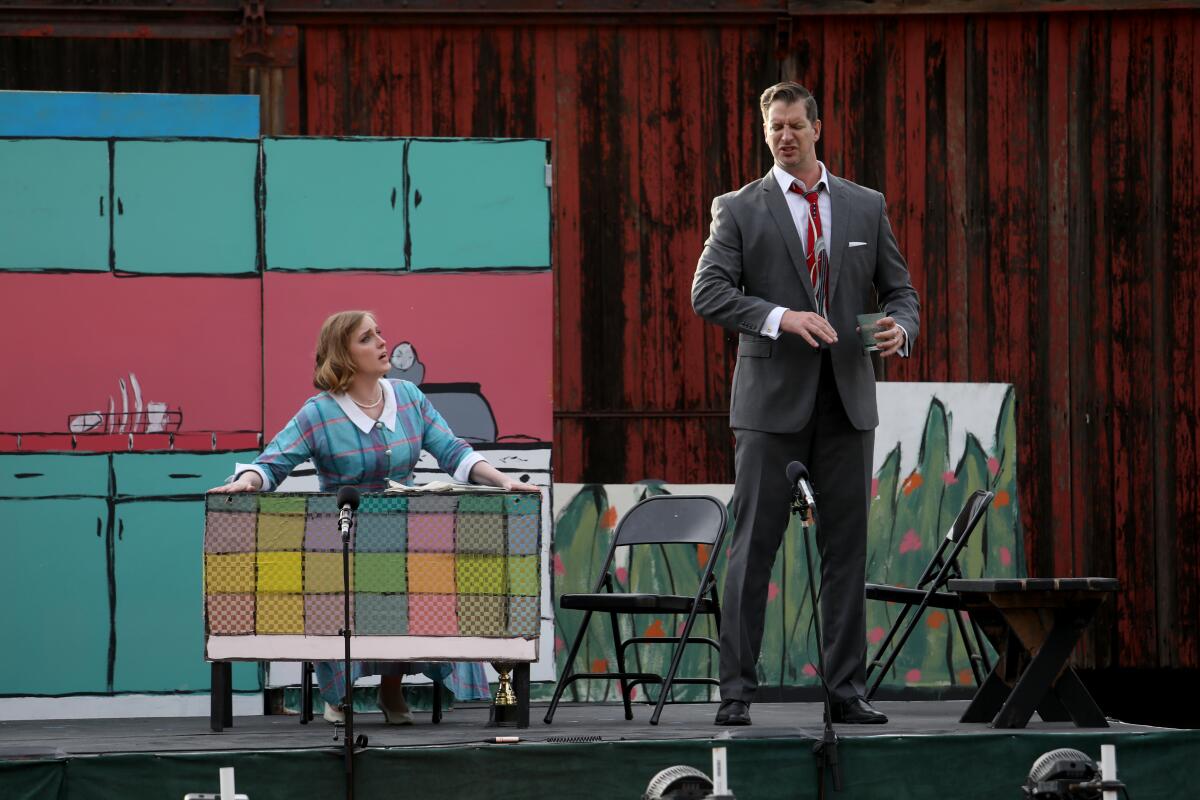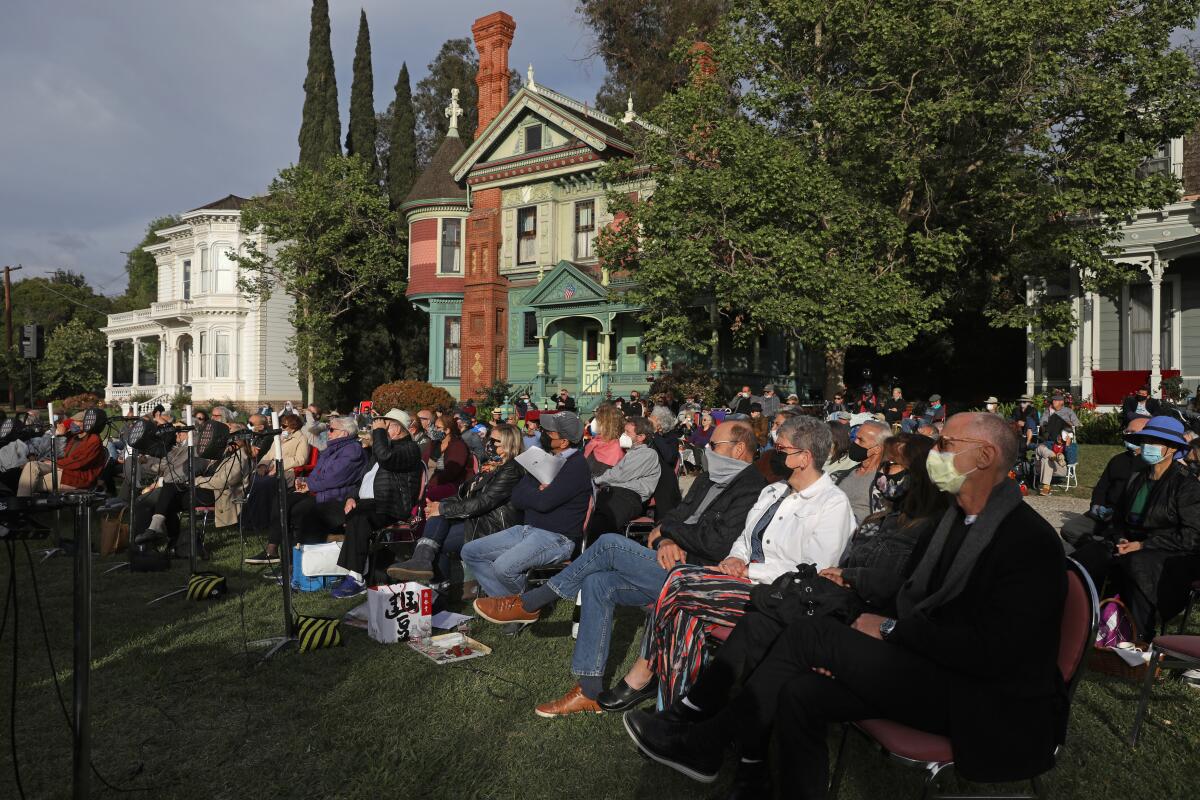L.A. gets its live opera back. What POP proved on an outdoor stage near Highland Park

- Share via
Pacific Opera Project’s production of Leonard Bernstein’s “Trouble in Tahiti” last weekend was full of firsts. It was the first opera production — indeed, the first major musical or theatrical event — in Los Angeles Country presented for a live audience in nearly 14 months (that is, if you don’t count drive-in events).
For the record:
9:53 a.m. May 11, 2021This article contains a typographical error misstating how many years passed between “Trouble in Tahiti” and the writing of “A Quiet Place.” The correct number is 30, not three.
I attended the Sunday matinee, the third of four performances on the lawn at Heritage Square Museum. It was surely the first time an opera singer began her star-making aria by exclaiming “What a terrible, awful movie!” with wondrously convincing theatrical flair just as Hollywood’s glitterati, a mere five miles and three Gold Line stops away at Union Station, were exclaiming what wonderful movies were receiving Oscars. Perky nomad opera versus “Nomadland.”
It was likely the first time a married couple had portrayed the bickering married couple in Bernstein’s bitter, 50-minute chamber opera about the spiritual emptiness of suburban life in the 1950s.
It was without any question the first time “Tahiti” has been performed alongside the Arroyo Seco Parkway, America’s first freeway, paving the way to the suburban utopia that Bernstein warned us against. It just so happens that the Pasadena Freeway, as it’s better known, was completed in 1953, a year after the opera’s premiere.
But maybe more important than any of this was the fact that “Tahiti” was POP’s first production 10 years ago, mounted on a shoestring by feisty operatic beginners. That “Tahiti,” which can be found on YouTube, is, for all its youthful let’s-put-on-a-show charm, all but unwatchable.
The “Tahiti” on Sunday was mature, deeply affecting, solidly professional opera — with trademark POP touches of goofy humor. Surprisingly, the affecting part had nothing to do with the emotions of being back in a real audience. Instead, the wonder of POP’s “Tahiti” was its ability to overcome pandemic obstacles to staging live performance with a real audience.
So what was it like to watch an opera outdoors with a pal and 148 distanced others? POP’s stage, with its delightful Pop-art-ish little white house, was set up alongside the freeway; the museum’s splendid historic houses were behind the audience. Freeway noise was the aural background. Amplification, with stage microphones rather than lavalier mikes on the singers, wasn’t quite up to the job of dealing with that.
It was chilly and windy. Rather than an orchestra, there was electric keyboard, bass and percussion. Yes, it was wonderful to be back, but the lack of intimacy on all levels is not exactly being back, especially in opera. Yet POP pulled it off.

“Trouble in Tahiti” is Bernstein’s most misunderstood major work. Although it is rarely treated as such, the “little opry,” as Bernstein called it, is the essential middle of his tryptic about the meaning of life. The first is his 1949 Second Symphony, “The Age of Anxiety,” which takes its inspiration from W.H. Auden’s poem about alienation in post-World War II American society. “Serenade (after Plato’s Symposium)” from 1954, Bernstein’s coming to terms with “love’s powers, charms, and function,” to say nothing of its terrors and mysteries, is the third.
In all three there is a search for the transcendence of faith, arrived at cinematically in the symphony, wistfully in “Tahiti” and by throwing caution to the wind in “Serenade.” “Tahiti,” in particular, haunted Bernstein, especially in its seemingly futile, mythical search for “a quiet place.” Three years later, Bernstein wrote “A Quiet Place,” a full-length operatic sequel to “Tahiti,” his own domestic life having gone through endless travails, the search for meaning ever more compelling.
Everything about “Tahiti” is peculiar. It is partly based on his parents and was partly written on Bernstein’s honeymoon. Sam (Bernstein’s father’s name) is an aggressive, impatient businessman. He is inappropriate with his secretary and shows off at the gym. Dinah is his long-suffering wife. They live in Scarsdale, or any other place less than an hour from the city. A trio of scat singers acts as a Greek chorus, its observations ironically rosy.
The anger and alienation in “Tahiti” can be downright off-putting, be it Sam’s meanness at breakfast (he’s ever the dissatisfied instigator) or Dinah’s depressive disaffection. They wonder what went wrong, but they hardly seem to mean it.
Coronavirus may have silenced our symphony halls, taking away the essential communal experience of the concert as we know it, but The Times invites you to join us on a different kind of shared journey: a new series on listening.
The remarkable aspect about POP stars Megan and Andrew Potter is that they very much mean it. She has a rich mezzo-soprano that can covey the sound of pain absorbed. He is a soulful bass, the sound of power that has a mind of its own. Neither has a bite in his or her accents. Their body language suggests insecurity more than animosity. Both internalize anger.
Sam lets it out in his manly, whoop-de-doo gym aria that Andrew Potter made more playful, even a touch remorseful, than show-offy. Dinah’s showstopper, the aria “Trouble in Tahiti,” is her vivid description of a terrible movie that skewers American colonialism and Hollywood.
Megan Potter brought enough theatrical verve to be winning but daringly more subdued than usual, so overpowering is her quest for a quiet place.
The supporting trio included veterans Robert Norman and Ryan Reithmeier, both of whom were in the original POP production, along with Eleen Hsu-Wentlandt, also a longtime POPster. What a difference a decade makes. No longer just an outsider Greek chorus, the trio has became the populace.
That Josh Shaw, the artistic director and face of POP, has refined the production over the years is to be expected, but that he did this with élan on the fly is not. It has been only a few weeks since the county gave approval for live performance.
Yet the company proved, in this unfamiliar space, nimble as ever. It even managed frequent costume changes, showing off Maggie Green’s witty 1950s designs. Acoustically the instrumental trio led by pianist and music director Kyle Naig remained in the supportive background.
As for Shaw, he has no need for a quiet place. The pandemic has other priorities, namely immediacy. He told the audience that POP will be back at Heritage Square the first weekend in June. He’s still deciding on the opera. It doesn’t matter. In this strange time and strange place and strange way, the pandemic has made POP matter in a telling new way.
A James Baldwin-William F. Buckley Jr. debate is fodder for a REDCAT presentation, and CAP UCLA’s “Plastic Bag Store: The Film” mixes gravity with whimsy.
More to Read
The biggest entertainment stories
Get our big stories about Hollywood, film, television, music, arts, culture and more right in your inbox as soon as they publish.
You may occasionally receive promotional content from the Los Angeles Times.












